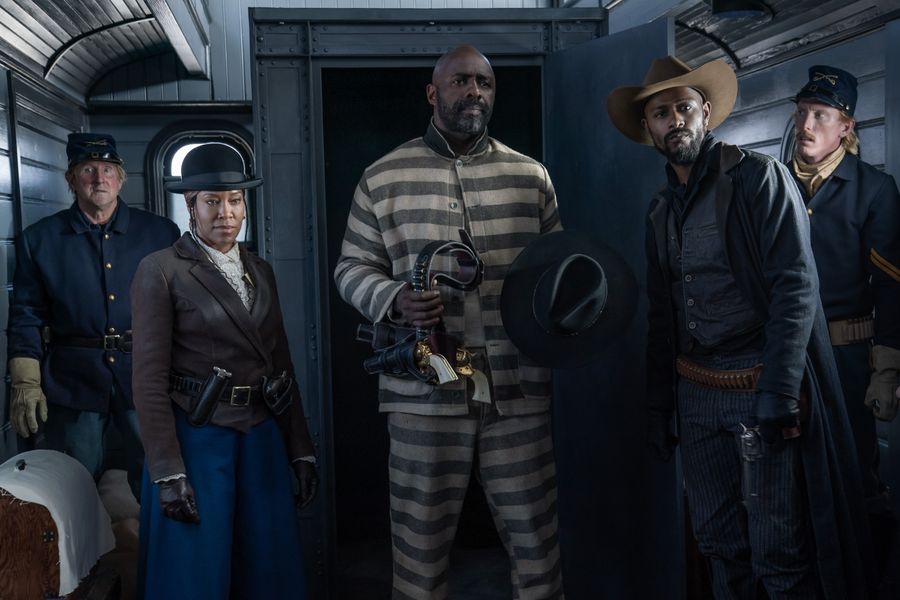If you are a western fan, a person deeply in love with the exquisite dirt of The Good, The Bad and the Ugly, you are likely desperately hoping to taste the violent nature of the fabled Wild West in its most earnest form. Luckily, Jeymes Samuels’ newest venture on Netflix, The Harder They Fall, is perhaps the closest we’ve seen to a bonafide western in years.
Samuels begins the film with an important note that states, “While the events of this story are fictional… These. People. Existed.” And indeed, they did! From Nat Love and Rufus Buck to Stagecoach Mary and Cherokee Bill, all these characters had real-life counterparts in the Old West. However, the characters have nothing in common except their names as Samuels, inspired by old Spaghetti westerns and Quentin Tarantino’s violent and provocative films, weaves a totally new tale of revenge and violent humanity.
While the films in the western genre predominantly focus on the white heroes and outlaws, Samuels subverts the stereotype and presents it from an all-Black lens where the white people only appear in snippets on the sidelines. They are portrayed as weak, racist imbeciles whose heads get blown off before they can utter the stray N-word.
With a brilliant ensemble cast that includes Idris Elba, Jonathan Majors, Zazie Beetz, LaKeith Stanfield, Regina King and more in lead roles, the film boasts a set of brilliant soundtracks that pay proper homage to the likes of Sergio Leone and his longtime collaborator Ennio Morricone. With producer Jay-Z contributing greatly to the reggae beats and the remixes that contain the characteristic western twang, Samuels uses his creative brilliance in music — Samuels has worked under the moniker of The Bullitts for some time — to create a surreal effect. The music complements the brilliant cinematography where the long-shots beautifully pan over the arid beauty of the West as well as focus on the small towns. The all-white town is literally white and slightly comical, to say the least.
The story revolves around Nat Love, whose parents are murdered in cold blood by the feared outlaw, Rufus Buck. Determined to seek revenge, he sets out with his ragtag team of outlaws- that also has the local Marshall- to end Buck and his gang of terrifying delinquents after the man is released from prison. What follows is violent bloodshed and an epic face-off between the duo, who turn out to be related by blood.
The film strikes a good balance between humour and dramatic tension. There are references to domestic abuse and how it emotionally scars a boy enough to grow up and seek his father for revenge. Buck’s terrible actions, in the beginning, plead for redemption when he reveals his horrifying childhood towards the very end of the film. His desire to build Redwood into the Promised Land, a Black utopia, though unanswered, finds some explanation in his revelation. Elba as Buck is a towering and formidable figure whose menacing facade hides a vulnerable past. Elba is highly underused in the film, watching the most crucial fight sequence behind glass windows when he should have taken centre stage. After having witnessed him in Beasts of No Nation, it is safe to say that his performance as Buck is perhaps one of the greatest of his career.
King and Stanfield hold up their characters well as the sly and fast Bill and the violent Trudy Smith. However, Beetz somehow overdid her character as Nat Love’s turbulent and volatile lover, Stagecoach Mary, as her western drawl stands out like a sore thumb amidst such brilliant performances. However, she is an absolute legend in the brilliantly stylised fight sequences, as are the others. You can find yourself bobbing your head in tune with the addictive music as they blow each other’s brains out.
Majors, as Love, provides an empathetic character study as he relives the traumatic experience of witnessing his parents’ deaths. The scar that Buck leaves on his head is a permanent reminder of the incident. As an outlaw, he robs the bank robbers and tries to keep his name clean. He is thirsty for revenge and refuses to stop at anything. He is charismatic and sensitive, unlike the typical taciturn cowboys that frequent the genre.
The brutal and gory vengeance is served against the expansive landscape of the West that receives appreciation via the wide lens shots. Samuels derives inspiration from Tarantino in his cinematography, especially in scenes that involve uber violence and bloodshed. While Samuels leaves the story somewhat underdeveloped and not answering certain questions, it is a good homage that is paid on his part to the classic 60s genre that has a huge fan following.
Touching upon topics of racism and revenge via the lens of the Black gunslingers, the film is an overall fun watch that helps relive the myths of the good ol’ West through a modern view.
